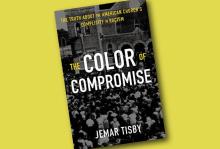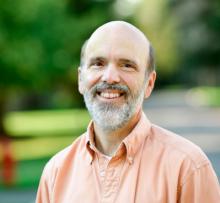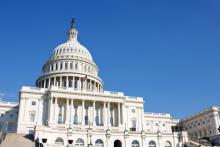compromise

A HAUNTING, emotionally charged, fact-based narrative, The Color of Compromise: The Truth about the American Church’s Complicity in Racism covers 400 years of American civil rights history. It is a withering look at the role white Protestant churches played in reinforcing institutional support of slavery and racism. Its main thesis is that moderate Christians have had the clout to rebut racism but have an abysmal record of doing so. This story is woven from a survey of biographies, memoirs, classics of history, and serious journalistic research.
White moderates, Jemar Tisby demonstrates, time and again mouthed sympathetic clichés toward the black community but inevitably supported the status quo. Probably the most iconic example Tisby gives is that of Billy Graham, one of the most prominent Protestant figures of the 1950s and 1960s.
Graham talked a good game: He publicly removed ropes segregating black churchgoers at his massive rallies. But despite these “positive” optics, Graham never participated in civil rights demonstrations. He instead insisted that civil rights was a local matter. He railed against communism, feeding into the term’s use as coded language that marked “subversive” U.S. political activity as evidence of Soviet influence. When the Watts riot broke out in Los Angeles, Graham quickly declared that “rioting, looting, and crime ... have reached the point of anarchy,” while failing to explain the profound issues that caused the rebellion.

After long deliberation about whether he would run, the Catholic Vice President Joe Biden announced Oct. 21 at the White House Rose Garden that he will not seek the Democratic Party's nomination for president.
"I've concluded, [the window for running for president] has closed," Biden said, with President Obama and his wife, Jill Biden, beside him.
"I believe we're out of time, the time necessary to mount a winning campaign."

Yet another Pledge of Allegiance lawsuit has been filed, this time with New Jersey humanists challenging the requirement that each school day begin with recitation of the pledge describing the United States as one nation, “under God.”
This case joins a bevy of previous cases that have wended their way through the courts, costing school districts and states millions of taxpayer dollars and contributing to bitter disputes across the country. To date, the Supreme Court has studiously avoided ruling on such cases, but if this continues, eventually, the court will be required to join the fray.
I am always sorry to see these cases: On the one hand, I am sympathetic with the students and parents who do not want their children indoctrinated in religion by a government, even with a very general declaration of the existence of God. (And I am always disappointed that so many people who vehemently insist that government is incompetent want government to lead prayer.)

The federal government began shutting down overnight, for the first time since 1996, after Congress failed to compromise on how to fund federal agencies — battling instead over implementation of the Affordable Care Act.
From The Washington Post:
The impasse means 800,000 federal workers will be furloughed Tuesday. National parks, monuments and museums, as well as most federal offices, will close. Tens of thousands of air-traffic controllers, prison guards and Border Patrol agents will be required to serve without pay. And many congressional hearings — including one scheduled for Tuesday on last month’s Washington Navy Yard shootings — will be postponed.
Faith leaders on Monday called on Congress to end partisan brinkmanship and consider the real damage their actions have on the American people.

I SPENT MY first year after college doing voluntary service in Portland, Ore., serving as the hunger action coordinator for a small Catholic organization called the Oregon Center for Peace and Justice. That fall, I joined a group of church anti-hunger activists from around the state in a meeting with our Republican U.S. senator, Mark O. Hatfield. We asked him a number of questions, and urged his continuing support for food- and hunger-related legislation.
When it came my turn, I said, “Senator, how do you reconcile the compromises that you inevitably have to make as a politician with the ideals you hold as a Christian?” In his reply, Sen. Hatfield pointed to the difference between compromises of principle—which he said he would never make—and the tactical compromises necessary to make progress in a pluralistic society. Without the latter, the senator said, politics is nothing but an ideological shouting match.
These days, it’s clear that most far-right Republicans, including those in the party’s leadership, take a slightly different approach to inter-party cooperation than did the late Sen. Hatfield. They seem to see it less as building bridges for the sake of governing a varied society and more as sleeping with the enemy.
There’s probably no better recent example than the issue of health care. The Affordable Care Act, aka Obamacare, is the law of the land—passed by Congress, signed by the president, and ruled constitutional by the Supreme Court. But none of those legal niceties seem to matter to the raw-meat GOP. Their attempts to circumvent or undercut the law range from the inane (such as 67 failed tries—count them: 67—to overturn the ACA by congressional vote) to downright bullying.

I just spent a wonderful and encouraging weekend with a church leadership team from Reisterstown, Md. I came away filled with hope for this congregation and with admiration for their clergy and lay leaders.
I wish our weak and tiresome political leaders in Washington and state capitals could visit this church in northern Baltimore County and see how mature adults of diverse backgrounds and viewpoints manage to put the congregation first.
They listened, spoke without barbed words and without aggression garbed in niceness.
They voiced their dreams, heard their differences, and then allowed a consensus dream to emerge. They understood the need to move on from yesterday. They were like two healthy parents trying to work a family problem. They seemed to trust each other.
Sojourners has always tried to understand and advocate for "biblical politics." But what does that mean now, especially as we approach another major election?
I was talking the other day to a Christian leader who has given his life to working with the poor. His approach is very grassroots -- he lives in a poor, virtually all-minority community and provides basic services for low-income people. He said, "If you work with and for the poor, you inevitably run into injustice." In other words, poverty isn't caused by accident. There are unjust systems and structures that create and perpetuate poverty and human suffering. And service alone is never enough; working to change both the attitudes and institutional arrangements that cause poverty is required.
In Galatians 5:19-20, Paul lists the "works of the flesh," contrasting them to the "fruit of the Spirit" immediately thereafter (Gal. 5:22-23). Among the works of the flesh are hostility, quarreling, jealousy, outbursts of anger, selfish ambition, dissension, and division. Another translation puts it, "People become enemies and they fight; they become jealous, angry, and ambitious. They separate into parties and groups ... I warn you now as I have before: those who do these things will not possess the kingdom of God."
At the end of Roland Joffé's exquisite film, The Mission, a brief exchange between a Portuguese ambassador and a papal emissary sums up the tension between globalization (the movie's subject matter) and a worldvi
In Tucson, Arizona, President Obama spoke to the state of the nation's soul. Next Tuesday, January 25, he will speak to the state of the union.